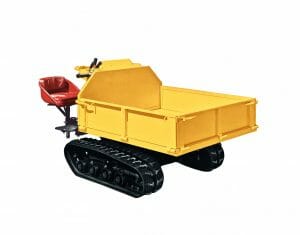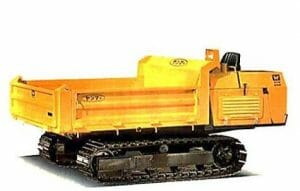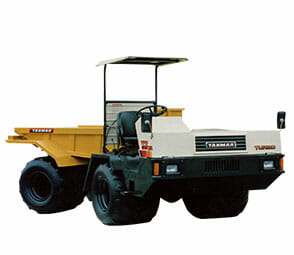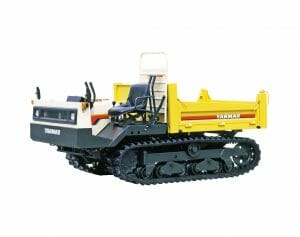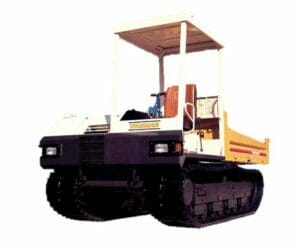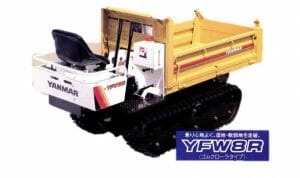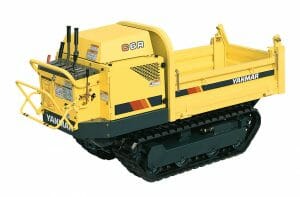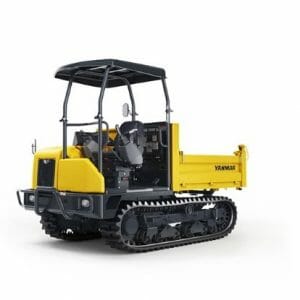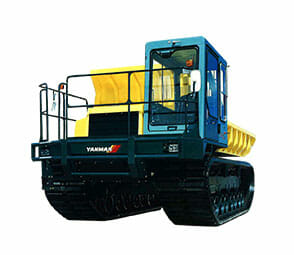
April 14, 2021 – Yanmar is celebrating the 50th anniversary of the YFW500D, the world’s first tracked carrier equipped with a Yanmar diesel engine.
The original carrier used the undercarriage of a Yanmar rubber crawler combine harvester, adding a cargo box to enable it to transport materials on soft ground. Created in 1971, the YFW500D was officially the world’s first tracked carrier. The pioneering model was the first in a long line of quality products from Yanmar, each of which were developed to meet specific market needs.
Yanmar, a global leader in compact construction equipment, is marking its 50th anniversary celebration by renewing the company’s commitment to developing high-performance products and solutions that offer premium reliability and value for customers. Through Yanmar’s contributions to urban development, including housing construction and infrastructure development, the company aims to build a society where everyone can live with peace of mind.
50th Anniversary of the Tracked Carrier and Major Models
|
<YFW500D>
|
■ 1971
By adding a cargo box to the undercarriage of a combine harvester, Yanmar pioneered the YFW500D – the world’s first tracked carrier. The model was powered by a Yanmar diesel engine and could transport materials on soft ground (where trucks and dump trucks could not).
|
|
<YFW26D>
|
■ 1978
The YFW26D had a large loading capacity of 3 tons and was equipped with a 17 horsepower Yanmar vertical water-cool ed three-cylinder diesel engine that enabled it to run quickly on slopes. The tough steel crawler was a favorite on worksites.
|
|
<YFW35WA>
|
■ 1984
In the late 1970s, the market for wheel carriers was growing, so Yanmar launched the YFW35WA articulated wheel carrier. Equipped with super flat special low-pressure tires for soft ground, the 27-inch (700mm) wide, 38-inch (945mm) diameter tires were an unprecedented development among conventional carriers.
|
|
<YFW25R>
|
■ 1985
Yanmar developed a rubber crawler that achieved a speed of 11 km/h, about twice the speed of conventional crawlers. The high-speed YFW25R carrier was a hit product that also featured the industry’s first reverse seat and was the prototype for the C30R model that is still sold today.
|
|
<YFW40R>
|
■ 1985
Equipped with a 64 horsepower Yanmar vertical water-cooled four-cylinder diesel engine, the YFW40R delivered impressive running speed and power, but also maximised operator comfort and used a large rubber crawler to reduce operator fatigue in a highly maneuverable HST. This model was the prototype for the C50R, which is still sold today.
|
|
<YFW8R>
|
■ 1988
Yanmar released the YFW8R, a compact carrier with a width of only 950mm – built tough to work hard on construction sites. Until the YFW8R, tracked carriers had their driver’s seats mounted to one side or the other. But with the YFW8R, for the first time in the industry, the seat was placed in the center. This made it easy to get on and off from both sides and provided better visibility. The TFW8R was the prototype for the C12R, which is still on sale today. |
|
<C6R>
|
■ 1990
The C6R was a 790mm wide mini carrier, specifically designed for civil engineering and suitable for urban renewal in densely-populated residential neighborhoods and narrow alleys. With impressive power and sturdy design, it was used for a wide range of tasks – from civil engineering to landscaping and forest road work in narrow areas where small pickup trucks could not go. |
|
<C120R>
|
■ 1996
The largest tracked carrier in Yanmar’s history, the C120R is a 240-horsepower, 11-ton load, large carrier that combines power and speed to meet the expectations of operators. The C120R emphasises strength, durability and operability from its basic structure through to every detail of the undercarriage.
|
|
<C30R-3>
|
■ 2000s
Yanmar launched a series of products equipped with environmentally friendly engines that met the strict emission regulations of Europe, the U.S. and Japan. Among them, the C30R-3 adopted a two-pump, two-motor hydraulic system, which enabled much smoother running and spin turns than before, and also incorporated the latest technology such as a GPS remote monitoring system. |

